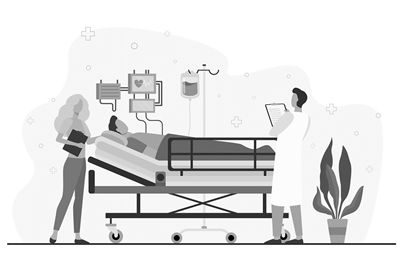
When it comes to the operating room, many people find it both mysterious and scary. Entering the operating room, you have to face medical staff with only eyes exposed, all kinds of large instruments and equipment, and you have to bear some surgical risks. Your nervousness, fear and anxiety prior to surgery are normal.
Before going to the operating table, many patients will ask: “Why do I have to take off my pants when I have upper limb surgery? Can I leave a pair of underwear?” This is something we hear every day, But I still have to answer: “Yes, you have to take it off!”
Why are patients naked during surgery? Find out today.
When it comes to nudity, it is a sensitive topic for Chinese people, and the first thing our operating room medical staff do to the patient before surgery is to assist you with pre-operative preparation.
The first is to facilitate operations such as catheterization and puncture
The anesthesia administration during the operation, the antibiotics before the operation and the blood transfusion during the operation, etc., these are all special needs of the operating room. of indwelling needles. And this special indwelling has relatively high requirements for blood vessels. We will first select some relatively thick blood vessels for puncture, and some special operations will also give patients two indwelling needles. In addition, some operations such as catheterization and central venous puncture are performed before the operation. If the patient wears clothes, it will cause inconvenience to the puncture and observation of various conditions during the operation.
Secondly, avoid infection caused by bacteria in the clothes
The operation must be strictly aseptic so that the operation can be carried out more smoothly. During surgery, surgeons work with human organs. There will be bacteria and germs in the patient’s clothes. In order to avoid the infection of the patient’s incision and facilitate the operation of the doctor, the clothes brought from the environment outside the operating room must be removed during the operation.
But don’t worry! We will cover the body with a sterile cloth, exposing only the part of the body that will be operated on.
In addition, when surgery requires extensive sterilization, if you are wearing clothing that will not meet the sterilization requirements, increasing the risk of infection.
Third, check the injury in advance in case of emergency
When encountering emergency trauma patients, they will directly enter the operating room through the green channel of the emergency department. This requires medical staff to completely remove the patient’s clothing before surgery, check the skin condition and whether there are invisible wounds.
Fourth, easy to implement anesthesia
Patients who require general anesthesia and spinal anesthesia for some long and complicated operations must be naked. During the procedure, the surgeon and the anesthesiologist will closely observe the various conditions of the patient.
If it is necessary to perform rescue and puncture intubation during the operation, every second is the golden rescue time. Removing all the clothes is a race against time for life.
The purpose of naked body surgery is to make the operation smoother and safer. Patients do not need to worry about exposing their privacy, our medical staff will protect your privacy from being disclosed. So if you want to have a smooth and safe surgery, you still have to accept the fact of naked surgery, don’t be shy and don’t feel embarrassed, our medical staff will bring you the warmest service.
Learn more
These operations all require removal of clothing
Surgical operations such as general anesthesia, spinal anesthesia, nerve block anesthesia, etc. We all require you to remove all your clothes, and depending on the surgical site, you also need to remove your clothes. Surgical operations such as abdominal surgery in general surgery and gastrointestinal surgery, thoracotomy in cardiothoracic surgery, replacement surgery and internal fixation surgery in orthopaedics, craniotomy and spinal surgery in neurosurgery, and perineal surgery in gynecology and urology.
Written by Chen Jian and Shen Li (Beijing Tsinghua Chang Gung Memorial Hospital)